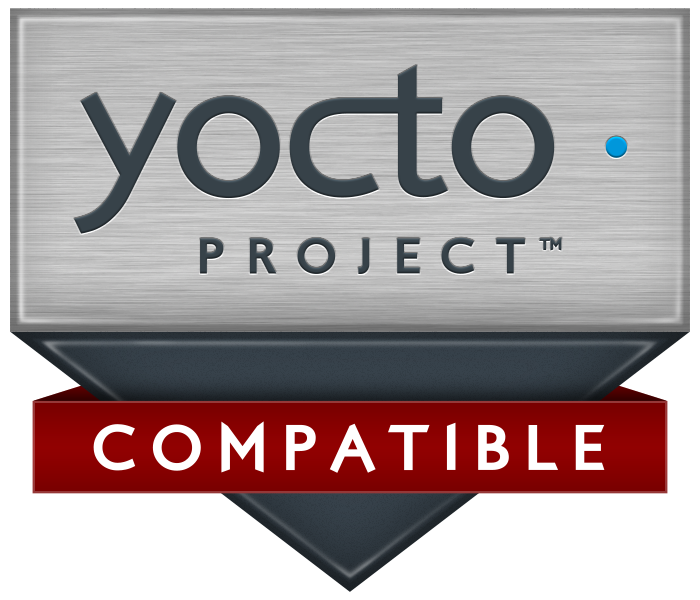[](https://github.com/kraj/meta-clang/actions/workflows/yoe.yml?query=workflow%3AYoe+branch%3Amaster)
 |
# meta-clang (C/C++ frontend and LLVM compiler backend)
This layer provides [clang/llvm](http://clang.llvm.org/) as alternative to system
C/C++ compiler for OpenEmbedded/Yocto Project based distributions. This can cohabit
with GNU compiler and can be used for specific recipes or full system compiler.
# Getting Started
```shell
git clone https://github.com/openembedded/openembedded-core.git
cd openembedded-core
git clone https://github.com/openembedded/bitbake.git
git clone https://github.com/kraj/meta-clang.git
$ . ./oe-init-build-env
```
If using poky ( Yocto project reference Distribution )
```shell
git clone https://git.yoctoproject.org/git/poky
cd poky
git clone https://github.com/kraj/meta-clang.git
$ . ./oe-init-build-env
```
Add meta-clang overlay
```
bitbake-layers add-layer ../meta-clang
```
Check `conf/bblayers.conf` to see that meta-clang is added to layer mix e.g.
# Default Compiler
Note that by default gcc will remain the system compiler, however if you wish
clang to be the default compiler then set
```shell
TOOLCHAIN ?= "clang"
```
in `local.conf`, this would now switch default cross-compiler to be clang
you can select clang per recipe too by writing bbappends for them containing
```shell
TOOLCHAIN = "clang"
```
also look at `conf/nonclangable.conf` for list of recipes which do not yet fully
build with clang.
# Default Compiler Runtime
Default is to use GNU runtime `TC_CXX_RUNTIME = "gnu"` which consists of libgcc, libstdc++ to provide C/C++
runtime support. However it's possible to use LLVM runtime to replace it where
compile-rt, llvm libunwind, and libc++ are used to provide C/C++ runtime, while
GNU runtime works with both GCC and Clang, LLVM runtime is only tested with Clang
compiler, switching to use LLVM runtime is done via a config metadata knob
```shell
TC_CXX_RUNTIME = "llvm"
```
TC_CXX_RUNTIME variable influences individual runtime elements and can be set explicitly as well
e.g. `LIBCPLUSPLUS` `COMPILER_RT` and `UNWINDLIB`.
Please note that this will still use crt files from GNU compiler always, while llvm now
do provide crt files, they have not been yet integrated into the toolchain.
# Default C++ Standard Library Switch
Using TC_CXX_RUNTIME variable will select which C++ runtime is used, however it can be overridden
if needed to by modifying `LIBCPLUSPLUS` variable, usually defaults used by `TC_CXX_RUNTIME` are
best fit. e.g. below we select LLVM C++ as default C++ runtime.
```shell
LIBCPLUSPLUS = "-stdlib=libc++"
```
in `local.conf`.
You can select libstdc++ per package too by writing bbappends for them containing
```shell
LIBCPLUSPLUS:toolchain-clang:pn- = "-stdlibc=libc++"
```
Defaults are chosen to be GNU for maximum compatibility with existing GNU systems. It's always
good to use single runtime on a system, mixing runtimes can cause complications during
compilation as well as runtime. However, it's up to distribution policies to decide which runtime
to use.
# Adding clang in generated SDK toolchain
Clang based cross compiler is not included into the generated SDK using `bitbake meta-toolchain` or
`bitbake -cpopulate_sdk ` if clang is expected to be part of SDK, add `CLANGSDK = "1"`
in `local.conf`
```shell
CLANGSDK = "1"
```
# Kernel build with clang
Newer kernels and Android kernels support clang compilation, and even support LTO, The following takes [rockchip](https://github.com/JeffyCN/meta-rockchip)'s kernel as an example to configure clang compilation. x86, arm and arm64 kernel supported full LLVM toolchain, other arch only support clang. more info https://docs.kernel.org/kbuild/llvm.html
- linux-rockchip_%bbappend
```shell
TOOLCHAIN:forcevariable = "clang"
DEPENDS:append:toolchain-clang = " clang-cross-${TARGET_ARCH}"
KERNEL_CC:toolchain-clang = "${CCACHE}clang ${HOST_CC_KERNEL_ARCH} -fuse-ld=lld ${DEBUG_PREFIX_MAP} -fdebug-prefix-map=${STAGING_KERNEL_DIR}=${KERNEL_SRC_PATH}"
KERNEL_LD:toolchain-clang = "${CCACHE}ld.lld"
KERNEL_AR:toolchain-clang = "${CCACHE}llvm-ar"
```
if you want use LLVM integrated assembler for some older kernel, newer vesion is enabled default.
```shell
do_compile:prepend:toolchain-clang() {
export LLVM_IAS=1
}
do_compile_kernelmodules:prepend:toolchain-clang() {
export LLVM_IAS=1
}
```
if you want enable LTO, append follow content.
```
FILESEXTRAPATHS:prepend := "${THISDIR}/${PN}:"
SRC_URI:append:toolchain-clang = "\
file://lto.cfg \
"
```
`CONFIG_LTO_CLANG`is need for some android based kernel, mainline kernel will do auto detect.
- lto.cfg
```
CONFIG_LTO_CLANG=y
CONFIG_LTO=y
CONFIG_LTO_CLANG_THIN=y
```
# Building
Below we build for qemuarm machine as an example
```shell
$ MACHINE=qemuarm bitbake core-image-full-cmdline
```
# Running
```shell
$ runqemu nographic
```
# Limitations
Few components do not build with clang, if you have a component to add to that list
simply add it to `conf/nonclangable.inc` e.g.
```shell
TOOLCHAIN:pn- = "gcc"
```
and OE will start using gcc to cross compile that recipe.
If a component does not build with libc++, you can add it to `conf/nonclangable.inc` e.g.
```shell
CXX:remove:pn-:toolchain-clang = " -stdlib=libc++ "
```
# compiler-rt failing in do_configure with custom TARGET_VENDOR
If your DISTRO sets its own value of TARGET_VENDOR, then it needs to be added in
CLANG_EXTRA_OE_VENDORS, it should be done automatically, but if compiler-rt fails
like bellow, then check the end of work-shared/llvm-project-source-12.0.0-r0/temp/log.do_patch
it should have a line like:
NOTE: Adding support following TARGET_VENDOR values: foo in
/OE/build/oe-core/tmp-glibc/work-shared/llvm-project-source-12.0.0-r0/git/llvm/lib/Support/Triple.cpp and
/OE/build/oe-core/tmp-glibc/work-shared/llvm-project-source-12.0.0-r0/git/clang/lib/Driver/ToolChains/Gnu.cpp
and check these files if //CLANG_EXTRA_OE_VENDORS* strings were replaced correctly.
Read add_distro_vendor function in recipes-devtools/clang/llvm-project-source.inc for more details.
http://errors.yoctoproject.org/Errors/Details/574365/
```shell
-- Found assembler: TOPDIR/tmp-glibc/work/core2-64-foo-linux/compiler-rt/12.0.0-r0/recipe-sysroot-native/usr/bin/x86_64-foo-linux/x86_64-foo-linux-clang
-- Detecting C compiler ABI info
-- Detecting C compiler ABI info - failed
-- Check for working C compiler: TOPDIR/tmp-glibc/work/core2-64-foo-linux/compiler-rt/12.0.0-r0/recipe-sysroot-native/usr/bin/x86_64-foo-linux/x86_64-foo-linux-clang
-- Check for working C compiler: TOPDIR/tmp-glibc/work/core2-64-foo-linux/compiler-rt/12.0.0-r0/recipe-sysroot-native/usr/bin/x86_64-foo-linux/x86_64-foo-linux-clang - broken
CMake Error at TOPDIR/tmp-glibc/work/core2-64-foo-linux/compiler-rt/12.0.0-r0/recipe-sysroot-native/usr/share/cmake-3.19/Modules/CMakeTestCCompiler.cmake:66 (message):
The C compiler
"TOPDIR/tmp-glibc/work/core2-64-foo-linux/compiler-rt/12.0.0-r0/recipe-sysroot-native/usr/bin/x86_64-foo-linux/x86_64-foo-linux-clang"
is not able to compile a simple test program.
It fails with the following output:
Change Dir: TOPDIR/tmp-glibc/work/core2-64-foo-linux/compiler-rt/12.0.0-r0/build/CMakeFiles/CMakeTmp
Run Build Command(s):ninja cmTC_928f4 && [1/2] Building C object CMakeFiles/cmTC_928f4.dir/testCCompiler.c.o
[2/2] Linking C executable cmTC_928f4
```
# Dependencies
```shell
URI: https://github.com/openembedded/openembedded-core.git
branch: master
revision: HEAD
URI: ghttps://github.com/openembedded/bitbake.git
branch: master
revision: HEAD
```
# Contributing
You are encouraged to follow Github Pull request workflow
to share changes and following commit message guidelines are recommended: [OE patch guidelines](https://www.openembedded.org/wiki/Commit_Patch_Message_Guidelines).
Layer Maintainer: [Khem Raj]()

